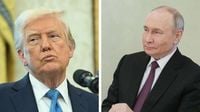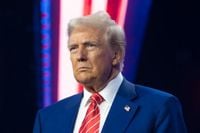In a dramatic escalation of tensions surrounding the ongoing war in Ukraine, U.S. President Donald Trump has publicly criticized Ukrainian President Volodymyr Zelenskyy, asserting that his refusal to cede Crimea to Russia is prolonging the conflict. This statement comes as negotiations aimed at reaching a peace deal falter amidst ongoing violence, including a recent deadly drone strike in Kyiv that killed nine civilians.
On April 23, 2025, Trump expressed his frustration with Zelenskyy, stating that the Ukrainian leader’s stance is harmful to peace efforts. "Nobody is asking Zelenskyy to recognize Crimea as Russian territory, but if he wants Crimea, why didn’t they fight for it eleven years ago when it was handed over to Russia without a shot being fired?" Trump posted on social media. His remarks followed Zelenskyy’s firm rejection of any proposals that would involve ceding territory to Russia, reaffirming, "There is nothing to talk about. It is our land, the land of the Ukrainian people." This comment was made just before a scheduled meeting in London among U.S., European, and Ukrainian officials meant to discuss potential peace strategies.
During talks in Paris the previous week, U.S. officials had reportedly floated a proposal that would allow Russia to retain control over certain occupied territories, including Crimea, which was annexed by Russia in 2014. This annexation has been a major point of contention in the ongoing conflict, which escalated following Russia's military intervention that same year.
As the situation deteriorates, Vice President JD Vance indicated that negotiations are at a critical juncture. "We’ve issued a very explicit proposal to both the Russians and the Ukrainians, and it’s time for them to either say ‘yes’ or for the United States to walk away from this process," he stated. Vance’s comments underline the urgency for both parties to reach an agreement, with implications that the U.S. may withdraw its support if progress is not made.
Meanwhile, Zelenskyy, mourning the civilian casualties from the drone strike, reiterated Ukraine's commitment to a ceasefire and called for an "immediate, complete, and unconditional ceasefire." He emphasized that Ukraine is prepared for any negotiation format that could lead to peace.
However, the U.K. Foreign Secretary David Lammy noted that the upcoming talks in London would be downgraded, as Secretary of State Marco Rubio was unable to attend, raising concerns about the effectiveness of the discussions. Kremlin spokesman Dmitry Peskov commented on the stalled negotiations, stating that positions on several issues have not been aligned.
In a twist, Trump has claimed that a deal with Russia is close, implying that Zelenskyy’s intransigence could jeopardize the prospect of peace. "I think we have a deal with Russia. We have to get a deal with Zelenskyy," Trump remarked, suggesting that his administration is willing to recognize Russian claims over Crimea, a move that has sparked outrage among Ukrainian officials.
Ukrainian Deputy Prime Minister Yulia Svyrydenko responded to Trump’s comments, stating firmly that Ukraine will never recognize the occupation of Crimea. "There will be no agreement that hands Russia the stronger foundations it needs to regroup and return with greater violence," she declared, highlighting the unyielding stance of the Ukrainian government.
As the situation evolves, the humanitarian toll continues to rise. The recent drone strike in Kyiv not only claimed lives but also injured over 60 individuals, including six children, further intensifying the urgency for a resolution to the conflict. Images from the attack depict severe damage to residential buildings, with emergency services engaged in rescue efforts amidst the rubble.
Despite the grim circumstances, Zelenskyy remains hopeful for a diplomatic resolution. He has indicated that Ukraine is ready to negotiate but has made it clear that any concessions regarding territorial integrity are non-negotiable. His administration has consistently maintained that peace must be achieved without compromising Ukraine's sovereignty.
As diplomatic efforts continue, the international community watches closely. European allies have expressed concern over the U.S. approach, fearing that concessions to Russia could undermine Ukraine's position and embolden further aggression. While Trump has been vocal about his desire to end the war quickly, many analysts warn that his proposed solutions may favor Russia and lead to a precarious balance of power in the region.
In light of these developments, the path to peace appears fraught with challenges. Both sides remain entrenched in their positions, and with the U.S. threatening to withdraw support, the stakes have never been higher. The outcome of the upcoming talks in London may very well determine the future trajectory of the conflict and the stability of the region.
As the world awaits the next steps, the voices of those affected by the war echo louder than ever. The need for a just and lasting peace is paramount, but achieving it will require compromise, understanding, and a commitment to uphold the principles of sovereignty and territorial integrity.





